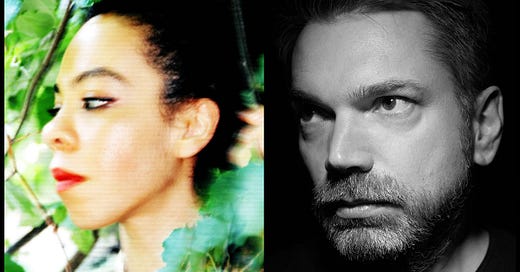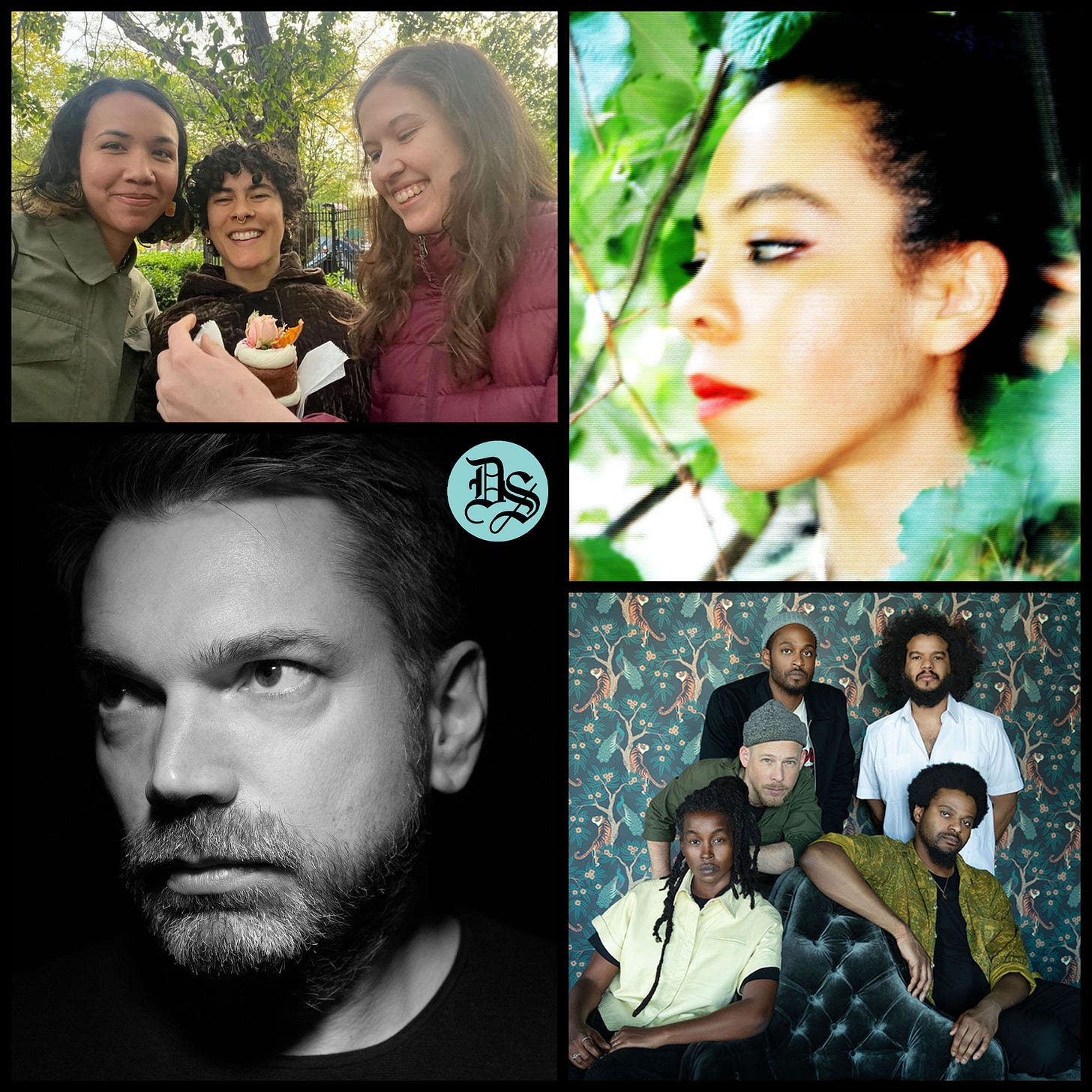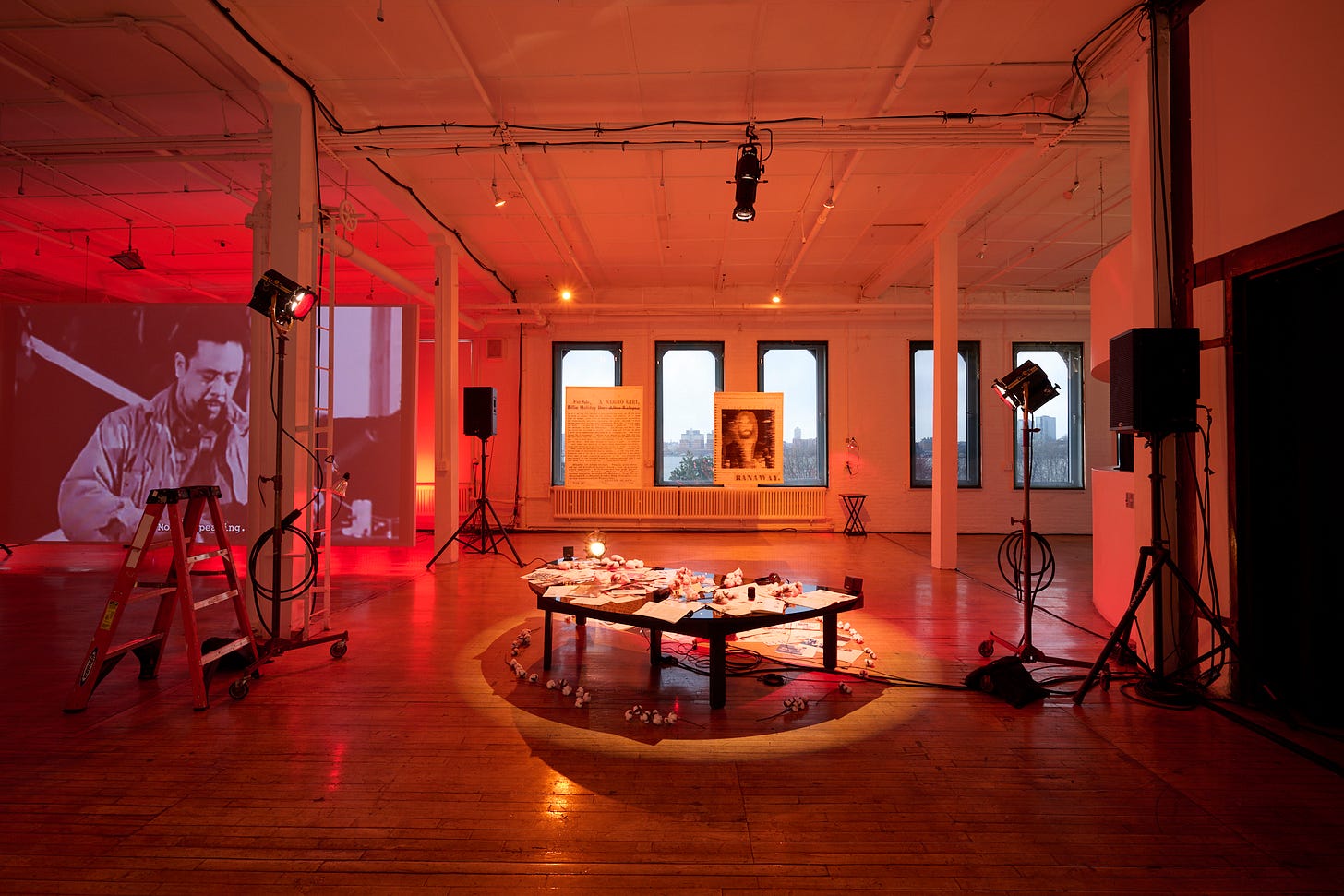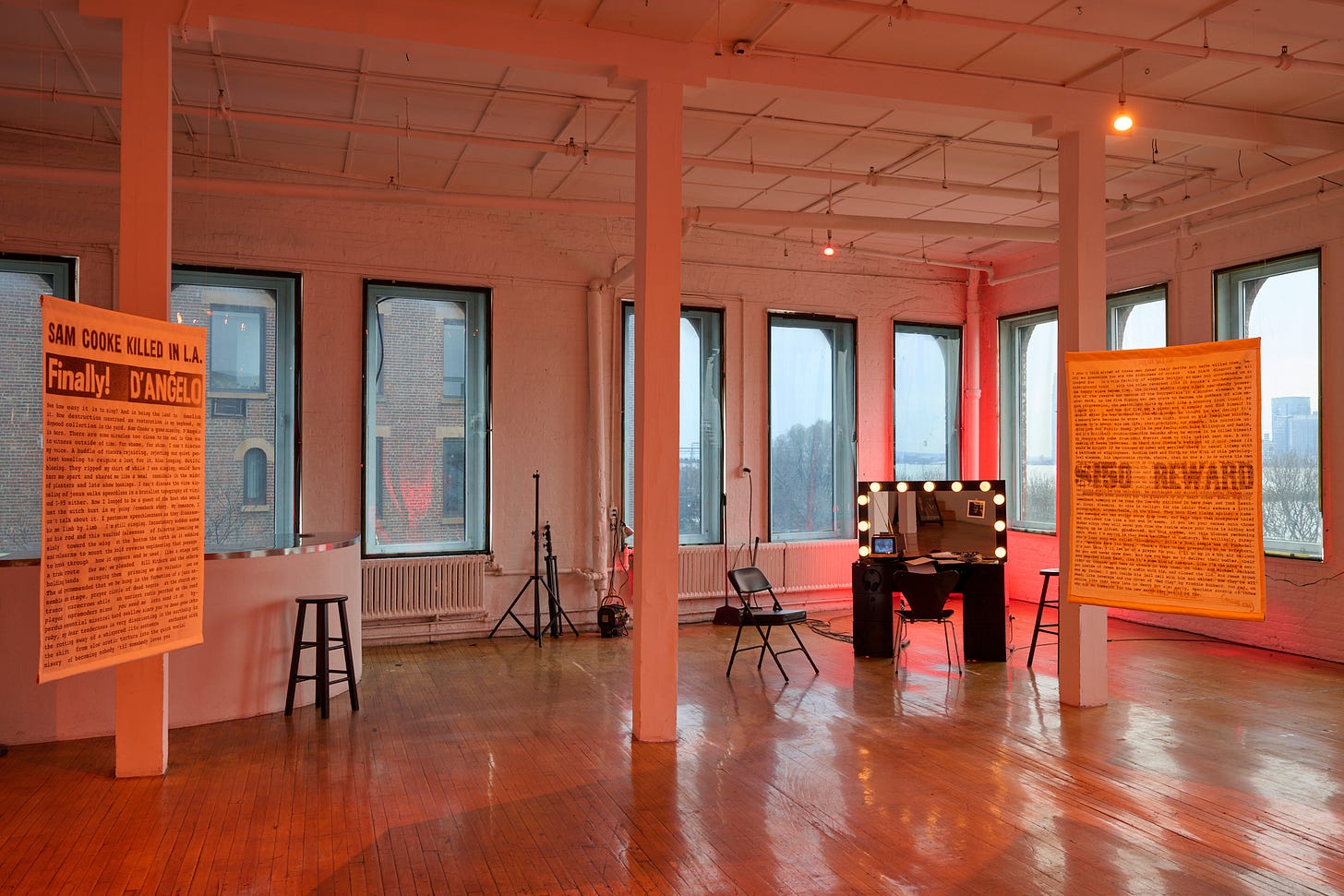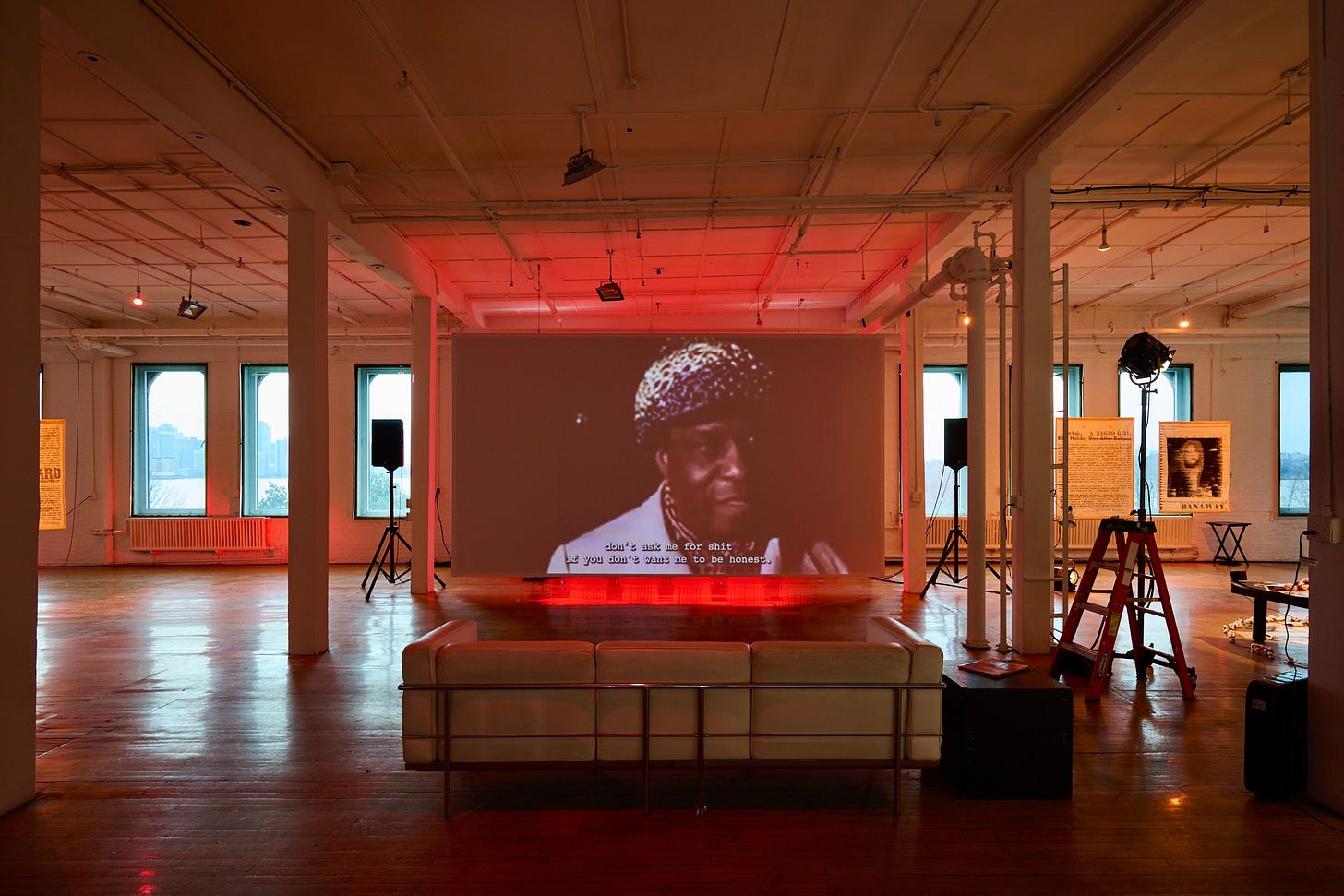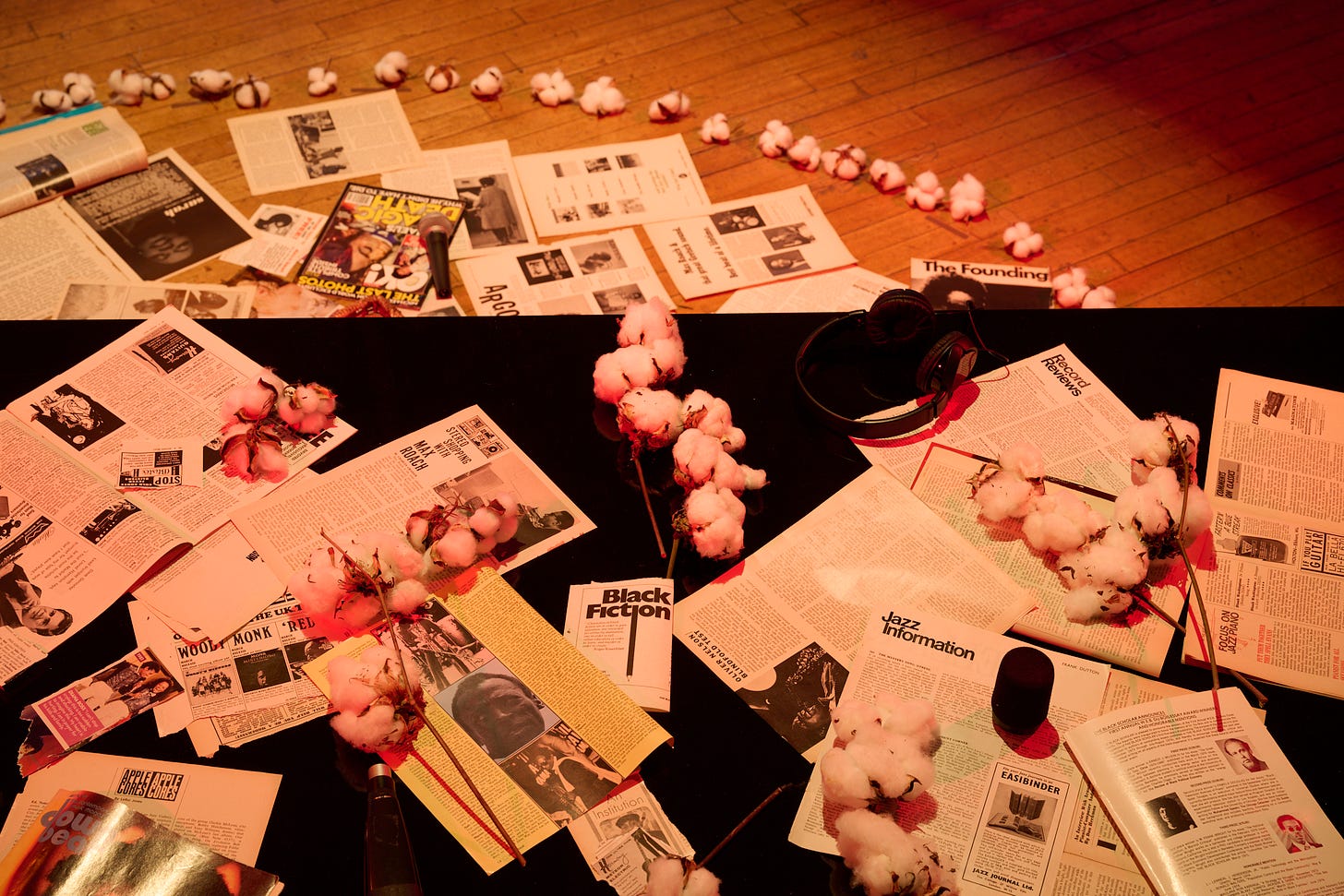On Harmony Holiday’s ‘Black Backstage’ | Bklyn Sounds 5/15/2024—5/21/2024
How the poet-writer's first gallery show continues reimagining the archive + Shows: Tilt / Moor Mother & Irreversible Entanglements / Shed / '24-Hour Drone: Experiments in Sound and Music' / more
Note: Apologies for the lateness of this week’s newsletter folks. I was finishing this up on Wednesday afternoon, and had a bit of a health emergency that basically incapacitated me for a couple of days. Essentially in the clear now. But a) I’m keeping the previews of all the great Wednesday and Thursday shows because there’s some great music in there, and b) making this one a full freebie. Back to regular next week.
In early 2018, a year before artist Tiona Nekkia McClodden took the Whitney Biennial by storm, she co-curated Julius Eastman: That Which is Fundamental, a two-week-long program at The Kitchen, at the time still on 19th Street. It encompassed a series of (then-rare) performances of music by the late composer, plus a gallery exhibit in two parts — A Recollection. and Predicated. — which was fully McClodden’s curation. Recollection was a straight-forward set of artifacts from Eastman’s creative life archival documents and printed ephemera, and recordings of remembrances by Julius’ friends; yet the liner notes added a touch of mystery, calling it “an invitation to look at remains, and” (key to my reading) “imagine what remains to be seen.” Predicated followed up on that touch, presenting new work by contemporary artists in conversation with Eastman’s life. Here, the abiding facts became a springboard to explore “notions of absence, trace presence, duration and the politics of exhaustion,” things one could intuit about Eastman’s living experience but not necessarily have proof,
The seeds of all this thinking came from McClodden’s three-plus-years within Eastman’s archive, leading to her investigation of “truth alongside the fact,” of “how a Black life is shaped by oral history…[and] include things that challenge and inform what you think you are seeing,” as she said in the program’s notes. The archive supplied the colors of the canvas she was working on, and informed the “how” and “what” of the work. But archival materials could only supply so much “truth,” artistic and curatorial instincts had to take over, and the result was a story familiar in broad strokes, yet startlingly new in detail. Before I began reading of Saadiya Hartman’s process, McClodden’s work with Julius Eastman already explained this new way of engaging information we have for evidence, and knowledge we have for narrative.
Six years later, poet-artist Harmony Holiday’s exhibit Black Backstage is also at The Kitchen, in its panoramic Westbeth loft. In the intervening period, the atmosphere around creative work and the archive feels like it has evolved: artful storytellers have increasingly come to terms with fluidly combining fact and memory, ephemeral detritus and permanent record, what history says, and what we know history can’t say. In other words, the value, breadth and limitations of the archive. Holiday’s writing looms these threads — historical knowledge, critical acumen, poetic voice, magnificent storytelling (including her own autobiography) — to weave together not only what we know to be true, but also what we felt and learned through the cracks, to be true.
Holiday’s topic of choice is Black musical creativity and genius, and the life it endures. She dives deeply into and pushes back against its public archive, which is famously white-owned and -policed, commercially and critically. Yet in setting this piece Backstage rather than onstage, Holiday leaves space for known unknowns and overheard confessions, the poetry and the myth of lives, which her work is singular at identifying, initiating and imprinting upon the reader’s psyche. In her mixture of words and images, the dimensions of musicians you’ve been listening to and reading about forever, grow exponentially, in ways that both astute fan-fiction and expansive criticism can recognize. At a time when so much writing about music feels a chore, Holiday’s critical prose is an avenging angel’s call-to-arms. So is her art — the two aren’t actually that far removed from one another.
Black Backstage is a set of installations and texts surrounding a film, unfolding, according to the wall-text, as a “thesis of rehearsal, resurrection, restoration and collaboration.” The installations take the title’s setting literally, while layering in historically grounded metaphors and parables. One piece, entitled “Life of the Party,” is a vanity-mirror table you’d expect to find in any green room: its surface crowded with magazines, a three-ring binder of contracts and instructions, a hair-curling iron and beautifying tools, an old portable TV and headphones, plus pinned snapshots of D’Angelo and Grace Jones, and of Prince staring into just such a mirror, all reminders of the scene’s commonality. A single cotton-flower on the edge of the table serves as a through-line. It echoes the other major installation piece, “Industry Plant,” an oversize seance circle with an outline of cotton flowers surrounding a pile of old ripped-and-torn jazz magazines, headphones and microphones, half strewn on the table and half on the loft’s floor. The cotton addresses the value society commonly places on Black musical genius as product.
Elsewhere, around the room are double-sided screen-prints, on which Holiday’s poems appear next to collaged headlines, and that cross-pollinate generations of Black artists with stories of Jim Crow- or antebellum-era atrocities. (There are also documents that do not need juxtaposition to make themselves understood, like Billie Holiday’s sarcasm-dripping letter to J. Edgar Hoover). A multi-channel audio cross-fires instrumentals, radio interviews and poetry readings across the loft, bringing a certain cacophony to Backstage, adding to a hurricane of historicity while always allowing the eavesdropping into a grander purpose. There is a kind of safety and freedom to be found back here, this set-up implies, the kind that isn’t available onstage.
The exhibit’s central piece is a film entitled “Abide With Me,” a 38-minute collage of, primarily, home, road and documentary videos of jazz legends; it is accompanied by a monologue written by Holiday and read by Fred Moten. The wall-text calls it a meditation “on Black artistic identity before fame, through a close look at the life of Thelonious Monk.” The video is indeed heavy on a happy Monk spinning himself around and around, but also on home films of the Coltranes, snips of the 1968 Charles Mingus doc where he gets evicted, and a stream of clips of Charlie Parker on the bandstand, Cecil Taylor backstage, and Rahsaan Rolan Kirk blowing his horns in a park. These are surrounded by black & white b-roll of street lights and marquees, which helps bring context to the other strung-together visuals of great Black musicians, all the off-the-cuff scenes falling under what Holiday’s liner notes call “corroborated hearsay,” the kind of images that may not provide clear submittable evidence but clearly get at the “truth alongside the fact.”
They pair wonderfully with what Moten is reading, a tale heavy on Monk’s biography (maybe even featuring the pianist’s first-person POV at times), but more broadly addressing an alter-history of beauty in survival. Spiritual verses, yearnings of the imagination, details in rhythm. The relationship between grainy images of legends and laser-guided precision of the poetic text, all mix inside the loft’s chaotic sound-design, disentangling from one story and attaching itself to another. All of it, inhaled together, feels a basis for a fuller, more personal treatise on the “formlessness of inspiration,” indictments of how “bare bones of dead performers became a platform.” It’s a tsunami of ideas, and keeping up with it requires doing the werk.
If you read Holiday’s indispensable Black Music & Black Muses newsletter, or follow her on social media, much of this material and her approach will not be unfamiliar. Yet in the gallery space, it feels contextually novel, closer in form to the work of Arthur Jafa and Nekia McLodden, and to the installations Jason Moran was involved in building during his Whitney retrospective, especially the recreation of the legendary Slugs Saloon, a newly built stage of a famous Lower East Side club that hosted shows throughout the Moran exhibit’s museum run. Because, on some level, all this has to return to the fuller notion of sound-making in the moment.
When I first visited Black Backstage last Saturday (5/11), it was, in fact, for Holiday’s interpretation of community sound-making, of extending the vision of the exhibit’s historically focused timeline. The Woodshed, a phrase straight out of the jazz tradition that means to develop ideas, was a day-long performance program co-organized with the help of two Bklyn-based sound artists, composer Jeremy Toussaint-Baptiste and musician/curator Taja Cheek (aka L’Rain). Over the course of two four-hour blocks on Saturday, musicians, musickers and sound-makers, all of them Black and part of the NYC community — folks like Melanie Charles, the production/DJ duo Scraatch, ambient producer Rena Anakwe (A Space For Sound), event producer/musician Amani Fela (Still/Moving), and vocalist-songwriter Contour — acted as the “house band” core, while others came and went , playing and abandoning a set of instruments provided by The Kitchen. (Or in some cases, instruments they brought themselves — though I did not see him play it, the artist Kevin Beasley arrived with a wondrous looking kalimba in tow.) You could call what was taking place a jam session, but it was more communally intentional, free-associative and musically strenuous than that. Over the 90 early-evening minutes I spent there, the loose musical energy and group hang was directly in keeping with the kind of freedom and exchange that Black Backstage declared takes place outside of the white gaze and its monetization, and thus has no place in an official archive.
It is no revelation to say that this discrepancy is changing, and with it, how we engage the past, what we take emotionally from it, which joys and traumas, which sounds and visions. What we may wanna bring into the future, and who we want to find there.
Harmony Holiday: Black Backstage (on view through May 25th, 11a-6p @ The Kitchen at Westbeth, Manhattan - FREE)
This Week’s Shows:
A great double bill of two very different kind of singing song-makers. Tilt is a vocal trio of Isabel Crespo Pardo (also in sinonó), Carmen Quill (also on bass) and Kalia Vandever (also on trombone), whose intertwined complexity gives off whiffs of both new-music and minimalist takes on songbook standards, full of melody but also weird turns. As long-time readers know, June McDoom is prolly my favorite indie-folk singer in the city. This one has the chance to be an “I was there” sort of pairing. (Wed 5/15, 7p @ Public Records, Gowanus - $25)
I became familiar with bassist Stephan Crump from his time in Vijay Iyer’s bands and on the pianist’s recordings of the early ‘00s, and have been finding him in less-straight-ahead and more baroque soundscapes for a decade. Yet the new Slow Water, Crump’s fifth or sixth album as solo leader, is the first one I’ve fully lived with, and it’s textures (drum-less, harmonically glorious mix of strings, brass and vibes; melodies and atonalities fitting like hand-and glove) fit right into a pastoral composer mindset. The accompanying band — Patricia Brennan on vibes, Joanna Mattrey on viola, yuniya edi kwon on violin, Jacob Garchik on trombone, and Kenny Warren on trumpet — is next-level, and the tunes are glorious. Tonight’s sets mark the album’s release show. (Wed 5/15, 7:30p & 9:30p @ Jazz Gallery, Manhattan - $25-$35)
Quirky double-bill of instrumental music on the naturalist (again!) ambient-jazz-jam axis. Trumpeter Nate Wooley’s Columbia Icefield was a by-turns noisy-and-expansively-beautiful quartet that made a 2019 album which gave free reign to guitarist Mary Halvaron and pedal-steel player Susan Alcorn, while Ryan Sawyer’s drums tried to make propulsion sense of the matter. They return, but with Ava Mendoza in the guitar chair. Support comes from Animal, Surrender, a bass+drums duo of Peter Kerlin and Rob Smith who embrace the jambandia aspects of ‘90s Thrill Jockey instrumentalists. Beautiful stuff. (Wed 5/15, 8p @ Union Pool, Williamsburg - $20)
It’s never a bad time to check-in with Jim White & Marisa Anderson — the drummer to the goth-roots-indie stars, and the guitarist of improvised pastoral-folk noise-scapes are masters of their instruments, and their playing has always fit together wonderfully. They have a great new duo album, Swallowtail, that is like a lo-fi country raga excursion, and their sets always have moments when you forget to breathe for following the music too far. Opening is French Canadian singer, Myriam Gendron. (Thurs 5/16, 8p @ Le Poisson Rouge, Manhattan - $20-$30)
As mentioned last week, Luke Stewart’s Silt Trio (featuring tenor saxophonist Brian Settles and drummer Trae Crudup) have a great new album, Unknown Rivers. And their performance of it at Sisters this past Tuesday was fire. The Trio is teaming up with Arts For Art to have a second album release show, this one in the old Loisaida stomping ground of “the music.” (Nublu Classic is just around the corner from the original Slugs Saloon.) One more night to celebrate the music. This time the opening act will be the poet No Land and NYC reeds legend, Daniel Carter. Would not be at all surprised if both jumped into the mix at some point. (Thurs 5/16, 8p @ Nublu Classic, Manhattan - $20)
Downtempo, Flora’s, excellent all-lady-selectahs R&B DJ night, returns to Jupiter Disco with Cosmo and DJ Tara at the bonus controls. These are some of my favorite low-key musical situations — a clear but loose prompt, and people who know their records. The kind of night that helps clear the head of bullsh*t. (Thurs 5/16, 10p @ Jupiter Disco - FREE)
Friday and Saturday marks this year’s installment of Kris Davis’ Two Pianos in a Conversation (mini-festival? program?), of four sets by different duos, with the incomparable host always in the mix. Friday at 7:30p is the pick of the litter: Kris Davis sharing space with Craig Taborn. I once saw them do this 196 keys thing at Issue Project Room, after the release of their excellent 2018 album Octopus, and it was glorious. (Fri 5/17, 7:30p @ Jazz Gallery, Manhattan - $35-$45)
Be-In is a deep listening experience featuring two sets of bold-face-name improvisers — Isaiah Barr playing with Jon Nellen + Adam O’Farrill playing with Mary Halvorson and Alex Koi — and Keith & Bestamo. The whole thing takes place at a wonderful DIY space in north Bklyn that was supposed to close but continues to quietly have excellent shows. (Though I think they’ve cut-out the all-night parties.) I’m still trying to get a sense of how loudly they wanna promote all these, but this Friday’s feels like one that more people should know about. Truly one of the best places to see and hear music in NYC. (Fri 5/17, 8p @ secret Bklyn location - $25-$35/RSVP required for location)
Tokyo DJ Nari is one of the founders of CYK, an eight year-old house music collective key to that city’s homegrown dance-music community. (The monthly CYK Tokyo Radio mixes they curate are an excellent primer to the new talent coming out of Japan’s capital.) In his first trip to NYC, Nari is joined by Texas-to-Bklyn transplant Stonie Blue, a post-lockdown regular at Cafe Erzulie, who’s been cutting his house music with hip-hop and club beats since the late ‘10s; Stonie’s records for his own BIYDIY label have major personality. (Fri 5/17, 10:30p @ Black Flamingo, Williamsburg - $10)
I fell hard for Berlin minimalist techno in the mid-‘00s, but though the fascination didn’t last, a couple of the scene’s big producers became permanently lodged in my DNA. Best known as Shed (he records under numerous names), Rene Pawlowitz is one of them. Always in love with dub and sub-bass, jumpy with skittery breakbeats that hinted at (though never fully gave themselves to) drum’n’bass, happy with half-time downebats, Shed has remained essential listening because his music continuous to hint at ideas of meaningful warmth, pleasure and joy that aren’t necessarily that scene’s calling cards. Pawlowitz rarely comes to the States which is why I am suggesting braving PR on a Friday night. There’s all-night-long goodness in other rooms too, with PR regulars Ge-ology taking over the Atrium and Cosmo upstairs.. (Fri 5/17, 11p @ Public Records, Gowanus - $20-$27)
An absolutely magnificent opportunity to hear the music of a noted and rarely performed Black American composer. I first came upon Talib Rasul Hakim’s name doing research on Julius Eastman, and discovered his relation to one of my favorite drummers Joe Chambers. (Hakim, born Stephen Chambers and deceased in 1988, was his older brother.) I know little about Talib Rasul Hakim, but “Visions of Ishawara,” which was included on Columbia’s excellent Black Composer Series of the mid-1970s, is an excellent symphonic work. Now, the International Contemporary Ensemble and ensemble Either/Or co-present an afternoon program of works by the legendary Society of Black Composers co-founder. (Sat 5/18, 2p @ New York Public Library for the Performing Arts, Manhattan - FREE with RSVP)
Speaking of Dada Strain’s DNA. Few artists have influenced my listening habits in the last five years as much as Moor Mother (Camae Ayewa) and members of the Irreversible Entanglements quintet she’s a part of. (So much so that, full disclosure, I became their bio–writer as well as critical cheerleader.) The humanism of their community-driven, wordsmith-heavy, hip-hop- and hardcore-influenced folk punk jazz is like nothing I’ve experienced since being a kid in love with The Clash and Fugazi and Public Enemy, the righteousness and the swing. They’re in the Park Avenue Armory’s “Studio” room for a couple of special separate sets (Camae at 7p, the full IE at 9p), with separate and expensive tickets. (As of Wednesday morning, I am trying to cop Dada Strain readers a discount code. Stay tuned!) The setting may be odd, but chances are that what they bring to that space will be just exactly perfect. Highest Recommendation! (Sat 5/18, 7p & 9p @ Park Ave. Armory, Manhattan - $45-$55)
N/Um is a live-gear trio who plays excellent, wholly improvised minimal techno in places that I would rather not think about — both clubs and cultural events I’ve dragged and will continue to. But there’s something to be said about highly skilled music professionals raised on jazz, prog and gazillion-dollar studios who’ve come of age by pulling equally from Jeff Mills and, say, Oliver Nelson, and who don’t choose their audience. Forget contexts: if you’re down with, say, Matthew Jonson’s Cobblestone Jazz, N/UM, might be your vibe. This time they’re not playing one of those terrible places, but a late Saturday night set in a Ridgewood Cocktail Bar, with a name dear to me.(Sat 5/18, 10p @ Dada Bar, Ridgewood - $TBD)
UPSTATE: Like many other singular cultural events (especially in the tri-state area) that have jumped the track and gained a bigger audience, 24-Hour Drone: Experiments in Sound and Music has elements of the insufferable. So if you go, prepare to share space with the dressed-for-the-’Gram set, next to the weird drone heads, experimental musicians and graduate art students. But one thing the all-nighter at Basilica Hudson has not lost is the wonderfully diverse choices of noise-makers who fill this great cavernous sound cathedral anywhere, amon the greatest live music rooms anywhere near New York. This year, you’ll get sets by Dragonchild, Rena Anakwe’s A Space for Sound, Tyondai Braxton and Ben Vida, Lesley Mok and Shara Lunon, Ghost Ensemble performing works by the late Phill Niblock, Ephraim Asili doing the festival’s first-ever all-drone DJ set, and more. The Hudson train station is right across from Basilica, no car required, Just a sleeping bag. (Sat 5/18 Noon > Sun 5/19 Noon @ Basilica Hudson, Hudson, NY - $113)
Massive jazz-not-jazz bill. The Messthetics (aka Fugazi’s rhythm section, Joe Lally and Brendan Canty, plus the great D.C. prog-jazz guitarist, Anthony Pirog) renew their musical conversation with tenor saxophonist James Brandon Lewis. And prior to that, two of the city’s great improvising guitarists/song-crafters, Wendy Eisenberg & Steve Gunn, continue their running dialogue. Highest Recommendation! (Sun 5/19, 8p @ Bowery Ballroom, Manhattan - $22adv/$25)
FILM: BAM Cinema is playing a brand-new restoration of Horace Ové’s 1976 motion picture, Pressure, the first widely released British film directed by a Black filmmaker. The coming-of-age story of a Black youth growing up in London is often acknowledged as the theatrically released masterpiece of the late Trinidad-born filmmaker, but Ové also directed the historic documentaries, Baldwin’s Nigger (1969) and Reggae (1971), and the incredible 1971 mockumentary, The Black Safari. Highest Recommendation! (Playing until Thurs 5/23 @ BAM Cinema, Downtown Bklyn - $16)

